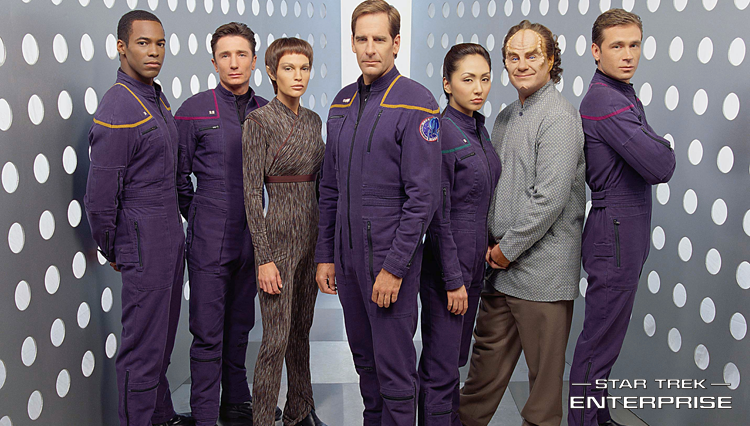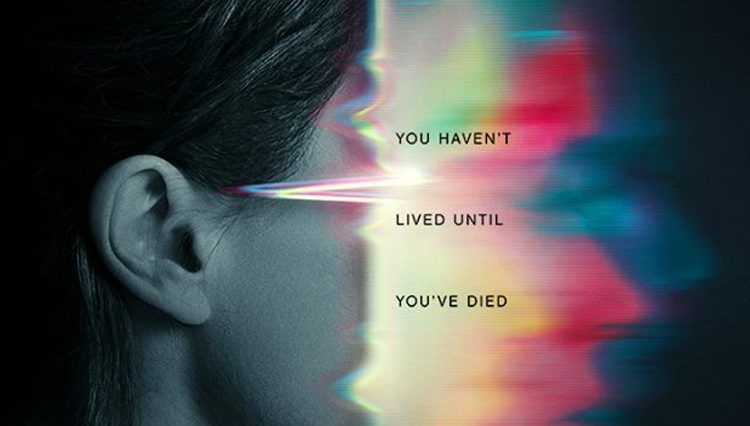
“I haven’t been living. I’ve been waiting to die.”
In Full Tilt Boogie, the revelatory documentary about the making of Robert Rodriguez’s vampire opus From Dusk Til Dawn, Juliette Lewis described the process of acting as a form of lying. Performance is a deception or shell game, obfuscation, and illusion, but Lewis cut right to the heart of the matter — it is a lie, but it is a lie we choose to believe when we watch our favorite performers in one movie or television show after another. Performers are not the parts they play, no matter how much they try to tell you otherwise.
They do not “live inside” the characters they portray. They may strive to be those people. They may lie to themselves about their motivations, to their fans, to Media, but the only truth of acting is the revelation of deception. Actors are paid to perform. The rest of us pay to watch them perform. Patrick Stewart is not Captain Jean-Luc Picard of the U.S.S. Enterprise. Captain Jean-Luc Picard is a work of fiction; a work of deception. Picard was created by Gene Roddenberry in 1986. Picard, like James Kirk, is Roddenberry’s hero; his mirror image and concept of Progress.

Five actors auditioned for the part, among them Yaphet Kotto, Roy Thinnes, and Patrick Bauchau (the early favorite). Roddenberry was adamant he didn’t want a bald captain sitting in the center seat, but producer Robert Justman fought for him. Star Trek: The Next Generation became an enormous success, yielding seven television seasons and four theatrical films, as well as bringing fans the spin-offs Deep Space Nine, Voyager, and Enterprise. This is a proud legacy. The films varied in degrees of disappointment because they were never able to capture the spirit of the television series, which thrived on ensemble storytelling, instead opting for the lone action movie hero aesthetic.
Even before the box-office failure of Nemesis, the final movie in the franchise, the legend grew. Stewart cross-pollinated in the science fiction genre with his welcome appearances as Charles Xavier in the X-Men franchise. 17 years after his appearance in Nemesis, Stewart returns to his signature portrayal of Jean-Luc Picard, but he does so at the cost of streaming entertainment. Those of us within the “X” generation remember never having to pay for Star Trek on television, so CBS All Access has the difficult job of convincing people to subscribe to their service based on the premise that their show, Picard, will be bigger and better than the show and character on which it is based.

Or they could be running a nostalgia gambit, assuming new viewers will subscribe to the series (and the streaming service) because they want to capture and bottle that feeling of youth my generation oozed when the show was in its prime. It’s important to remember, the show is not being produced for you — the individual: the trekkie/trekker who shows up to conventions with pointed ears. The show is being produced for a larger audience — a changing and growing demographic getting younger by the minute, which is what separates Picard from Trek of the past.
Imagine that you had only a passing interest in Star Trek when you were young, but you remembered all the catchphrases, trademarks, and mannerisms of the characters. You’re a fan of the show, but there are some things you don’t like. Flash-forward about 30 years, and you now have the opportunity to correct the show, and make it more palatable to your taste, and Star Trek: Picard is born. Or… Or you looked at a top ten list of the best episodes, and wrote a story around those ten episodes, and again I get the sneaking suspicion Picard was written by college graduates with Liberal Arts degrees. I know you don’t have a shot in hell to get a job anywhere these days without some kind of four-year degree (one of the last of our prejudices), but I doubt it mattered as much when Sir Pat was trotting the boards at Old Vic when he was a pup!
It’s 17 years after the events of Nemesis and the death of Data. You’ll remember Data bravely sacrificed himself to whisk Picard safely back to the ship before the thalaron generator exploded taking the Romulan ship with it. It’s a variation of Spock giving his life (in Star Trek II: The Wrath of Khan) to put the mains back on-line and whisk the Enterprise safely away from the Genesis torpedo detonation, but oddly less effective considering Spock isn’t dead for very long.

Data haunts Picard in his dreams. They play poker, though Picard never really had an interest in poker, and Picard watches Data paint a picture, though the style of the painting does not look like anything Data has ever painted. In order to fully understand Picard’s disillusionment with how things turned out in the future, the writers send a reporter to collect exposition via an interview where he explains his disgust with Starfleet. It seems there was a “synthetic revolt” (read: android uprising) on Mars. As it happens, a supernova wipes out the Romulan Empire (shades of Star Trek VI: The Undiscovered Country), but rather than aid in the evacuation of Romulans, Starfleet pulls their resources to destroy and then ultimately ban all synthetic lifeforms.
With political intrigue in place, we turn the spotlight on Dahj, a young lady recently accepted into the Daystrom Institute as a researcher, celebrating with her boyfriend when Romulan agents burst into her home and attempt to abduct her. She has no idea what’s going on until she suddenly snaps into Terminator mode and kills a bunch of them with some ridiculously impressive martial arts abilities. Why don’t these bad guys just swarm on her instead of taking turns? One of the more eye-rollingly cringe-inducing elements folded into the story is Dahj’s “psychic visions” of Picard. When they finally hook up, she tells him, “Everything inside me says that I’m safe with you.” I guess everything inside her is completely off-the-mark about this because she is promptly killed by another set of armed acid-spitting Romulan agents. There are two ultimately pointless (not to mention boring) action/fight scenes in the episode. Once you realize phasers could’ve ended these altercations, the house-of-cards narrative begins to fall apart.

It turns out Dahj was an android, but she didn’t know it. At least she might have a good reason for being able to kill a bunch of armed men. Picard visits the Daystrom Institute and gets the skinny on Bruce Maddox’s plan to clone androids from separate elements of Data’s prototype, B-4. Maddox, you might remember, once tried to seize Data and experiment on him asserting the android was the property of Starfleet. It’s amazing to me nobody ever kept an eye on him. The Leslie Bibb/Kristen Bell hybrid tech-girl assigned to Picard tells him Maddox’s androids were constructed as twins, so there must be another Dahj out there. Indeed there is, but that one is working at a Romulan “Reclamation” Site, whatever that is, but here’s the kicker: The Reclamation site is inside an enormous Borg cube. What?
So was it worth the wait? I could’ve answered that question before I watched it. No. It’s not worth the wait. It’s never worth the wait for a television series, or even a movie. It’s not worth attending “exclusive” screenings for a product that will be readily available to everyone in a few days just so you can publish your reaction before anybody else. You’re not as important as you think you are. It’s not worth creating hostile divisions among fans. It’s not worth getting angry because you disagree with a differing perspective or point-of-view. It’s not worth it to pile on and write click-bait reviews to boost your viewing figures. It isn’t worth it to buy into the deception and false promises of a franchise desperate in its desire to remain relevant in 2020. It isn’t worth it because all it does is create marketing opportunities for those ordained to continue this particular (and disgustingly ugly) tradition of fandom. It was a decent program. It wasn’t great, but it was decent.

There were some things that annoyed me. Picard wasn’t a poker player. Data would never paint that kind of picture. Worf’s discommendation was a private, internal matter within the Klingon Empire and not subject to a Media profile. Data looks absurdly creepy. If anything, Geordi was Data’s best friend, not Picard. The obvious, unoriginal “homage” to Blade Runner and Firefly**. There were some things I enjoyed. Picard calls his dog “Number One.” We see a couple of Bajorans. The “Captain Picard Day” banner! Patrick Stewart! Patrick Stewart is the main reason to watch the series. He is a wisp of himself, an older shade with a raspy voice, but he is as commanding a presence as he has always been — this is his show.
Minor, fan-service related quibbles aside, this is solid entertainment, and unlike Star Trek: Discovery*, it’s a confident adaptation carried by Stewart. He has the distinctive ability to raise every performer he plays against to his level, or at least near to his ability. He makes everyone (the lone exception being Isa Briones’ rather flat, uninteresting Dahj) better. There is enough story in “Remembrance” to sustain the series for some time, but we would be lying to ourselves if we did not acknowledge that Patrick Stewart is the only reason to watch Star Trek: Picard. He may not live inside Picard, but he does reside right next to him.
*Star Trek: Picard gets off to a much stronger start than Discovery in that Stewart carries the weight of the show, but that might be the inherent weakness of “fan service.” We feel comfortable knowing some form of canon is respected, and that there is an acknowledgement of spin-off shows. There is also believability. The big problem with Discovery (for me) is that I felt the actors did not believe or understand their dialogue. Again Picard succeeds only because of Patrick Stewart. It’s certainly not the story, which borrows heavily from many other sources and gives us a repetition of scenes that go nowhere. Even after some 46 minutes, the viewer will note that the story could have been told in half the time.
** What is with this obsession with Firefly of late?
Twice a week, Star Trek Rewind explores the Star Trek universe. From Archer to Janeway, Kirk to Picard, and Georgiou to Sisko — boldly read what no one has read before!



